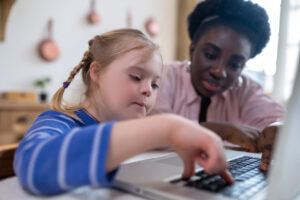
In this blog, we’ll navigate essential tips that will help you navigate this dynamic and fulfilling profession.
As a new-to-the-field special educator, building strong relationships with general education teachers is key to providing inclusive and supportive learning environments for students with disabilities. Take the initiative to meet with your general education colleagues regularly to discuss student progress, share strategies, and solve any specific challenges.
Consider providing an information sheet on each student that will be attending their class with appropriate accommodations, skill level, how to handle potential behavior problems, and helpful tips on how to best include your student. The general education teacher can then refer back to the information sheet throughout the semester/year. It is also helpful to set clear goals with the general education teacher on what success will look like for each individual student. For example, are you focusing on social skills goals during this time or on academics or both?
Providing specific and explicit examples of how the general education teacher can help support those goals will set everyone up for success (e.g., “Student” is working on speaking in full sentences, so if she uses 2-3 words, prompt her to ask you in a full sentence). By working alongside the general education teacher, you can ensure that all students receive the individualized support they need to succeed.
Parents and caregivers are essential partners in the education process. Take the time to listen to their concerns, answer their questions, and involve them in decision-making about their child’s education. Keep open lines of communication by asking for their preferred communication method and set appropriate boundaries for when/how you can be reached. At the start of the year, initiate positive interactions and continue to provide uplifting feedback throughout your time with their child. Recognize parents and families as valuable team members, soliciting their expertise and goals for their child. Share classroom insights and ways to reinforce learning at home. Acknowledge the challenges of parenting and actively listen to their concerns, seeking to understand their perspective. Show genuine care for their child, and offer resources for additional support. When parents/caregivers are genuine members of the team, everyone wins – especially the child!
Special education often involves collaboration with a team of related service providers, including speech therapists, occupational therapists, physical therapists, behavior specialists, etc. Work closely with related service providers to develop comprehensive support plans for your students. Be sure to frequently share progress updates and collaborate on strategies to address individual student needs. By working together as a team, you can provide holistic support that addresses the diverse needs of your students.
Paraprofessionals play an important role in supporting students with extensive support needs in the classroom. As a new teacher, it’s essential to establish clear expectations and communication channels with your paraprofessional team. Communicate well-defined responsibilities and foster open dialogue regarding schedule adjustments or concerns. Encourage professional growth by providing avenues for skill enhancement and involving them in relevant professional development opportunities. Regular meetings should be scheduled with your paraprofessional to review what they’re doing well, where improvements can be made, and to give you the opportunity to provide constructive feedback aligned with student needs. Delegating tasks according to each paraprofessional’s strengths and expertise fosters a collaborative environment, prioritizing student success. Offer constructive guidance for professional improvement and express gratitude for their dedication in nurturing a positive learning atmosphere on a regular basis. Recognizing their hard work contributes to a cohesive team dynamic, ultimately benefiting student outcomes and overall classroom environment.
The demands of special education can be intense, and it’s easy to become overwhelmed. As a new teacher, it’s crucial to prioritize self-care and maintain a healthy work-life balance. Don’t hesitate to ask for help and advocate for the resources needed for success. Allocate uninterrupted time daily for lesson prep and paperwork to manage workload efficiently. Organize tasks by priority, focusing on urgent items first. If a mentor isn’t assigned to you, seek guidance from experienced colleagues within the building for advice and encouragement. Remember, prioritizing self-care allows for sustained effectiveness in supporting students with diverse needs while ensuring personal well-being.
Embarking on a career in special education is both challenging and rewarding. By fostering collaboration, supporting parents and caregivers, working closely with related service providers, managing paraprofessionals effectively, and prioritizing self-care, you can make a meaningful difference in the lives of your students while maintaining your own well-being. Remember that you are not alone on this journey, and with dedication and perseverance, you can create inclusive learning environments where every student has the opportunity to thrive.
Contributor Bio
Dr. Lauren Hills earned her Bachelor’s Degree from Utah State University in Special Education-Severe Disabilities and her Master’s Degree from Utah State University in Special Education-Transition to Adulthood. She worked as a Life Skills middle school teacher for six years before she went back to school and earned her Ph.D. in Autism and Developmental Disabilities from The University of Texas at Austin. While obtaining her Ph.D., she supervised undergraduate special education interns and student teachers in PreK to Post High settings. In addition, she worked in home and clinic settings as a BCBA and eventually as a consultant for a school district. Lauren is passionate about helping students with disabilities reach their potential through inclusive and evidence-based practices.